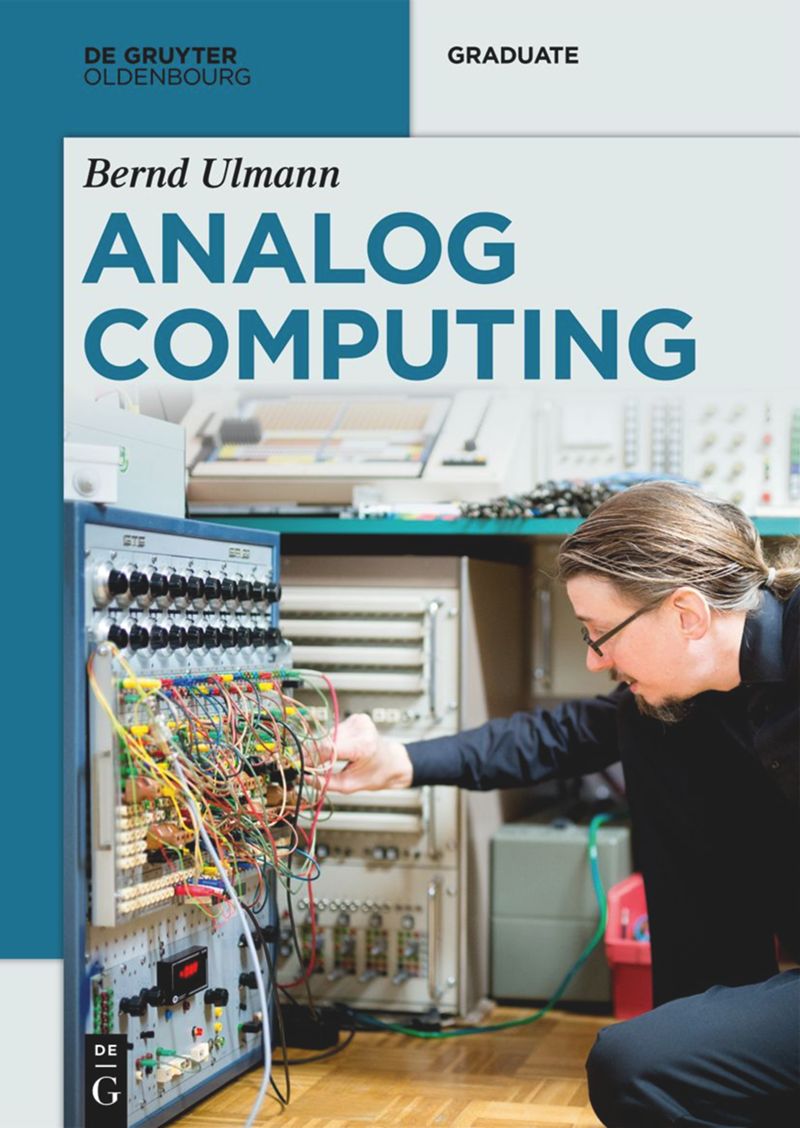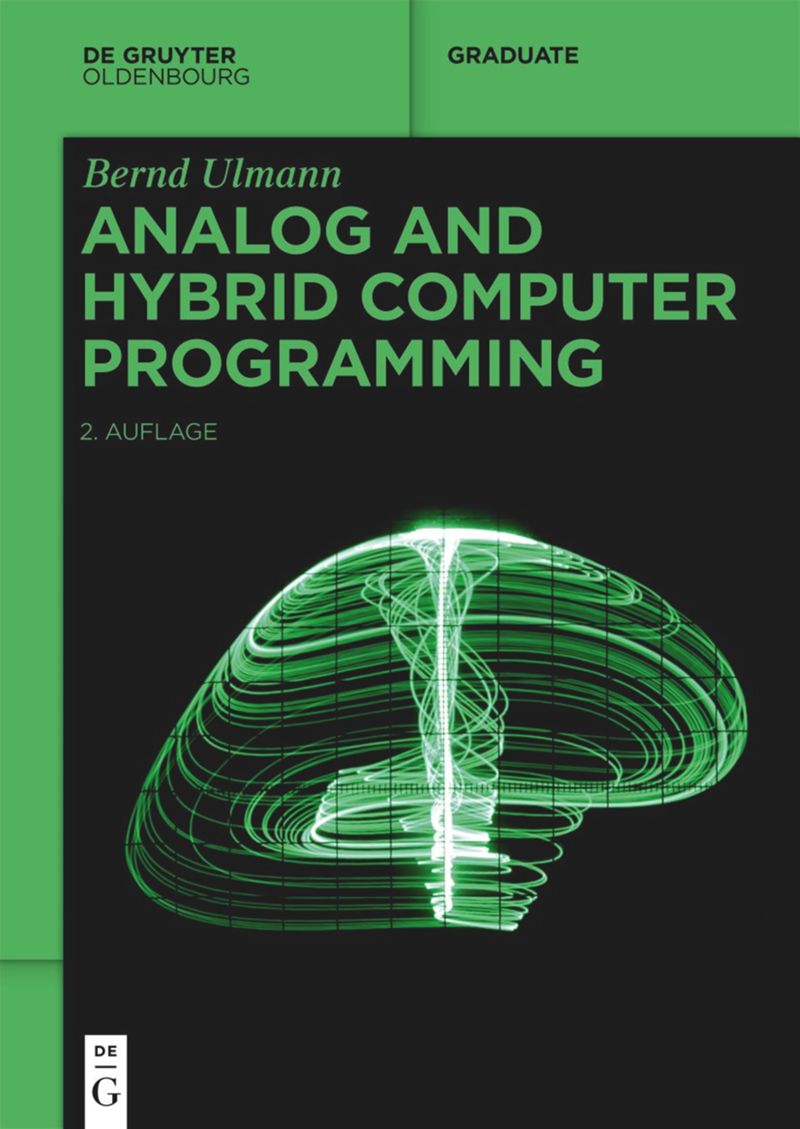Research Article
Analog Computing for the 21th Century
Ulmann 2023
This paper challenges the notion of analog computing as obsolete, highlighting its potential—alongside quantum computing—to surpass digital systems in performance and energy efficiency, while outlining digital limitations, introducing analog principles, and presenting recent advancements poised to reshape future computing.
About the author

Bernd Ulmann
Bernd Ulmann is a renowned expert in analog computing, with over 30 years of experience in IT, mathematics, and education. He is co-founder of anabrid GmbH, a company developing cutting-edge analog computing solutions and a professor at FOM University of Applied Sciences for Economics and Management in Frankfurt/Main. His expertise extends beyond academia and business. He is the curator of a unique Analog Computer Museum in Bad Schwalbach, Germany, which houses a world-class collection of analog computing devices. His passion for preserving and advancing analog technology has made him a prominent figure in the field.
More Publications

Analog Computing
Bernd Uhlmann, 2023This volume serves as an in-depth introduction to analog computing, addressing a significant gap in contemporary literature, as most foundational texts on the subject originate from the mid-20th century. It provides a critical link between the historical development of analog systems and their potential future applications. Although the principles underlying analog computation have been known for decades, they have largely receded from mainstream attention. Nonetheless, these methods present promising opportunities for achieving efficient performance with reduced energy consumption—capabilities that are increasingly relevant in today’s technological landscape.

Analog and Hybrid Computer Programming
Bernd Ulmann 2023As traditional digital computers near their design and performance limits, alternative forms of computation—such as analog and quantum systems—are drawing growing interest. Analog computers, in many cases, deliver faster results and use less energy than their digital counterparts, making them ideal partners in hybrid computing setups.
The second edition of Analog and Hybrid Computer Programming offers a detailed introduction to programming analog and hybrid machines. It features a wide range of hands-on examples and specialized functions.
A Function Generator on TSMC 65nm CMOS for Analog Computing
Vijayakumar, Pitonak, Killat 2024This paper outlines a function generator using a fully differential analog input. The signal passes through a current subtractor, offset comparators, a thermometer-coded X-iDAC, a programmable ROM, an 11-to-32 decoder, and a secondary Y-iDAC. This setup allows flexible and accurate waveform generation for analog computing and signal processing.
Dynamic delta sigma ADC with variable clock on 65 nm CMOS
Pitonak, Killat 2023This paper describes a dynamic delta-sigma ADC with a continuous-time modulator, FIR filters, and clock frequency control. Implemented in 65 nm CMOS at 1.2 V, the digital processing is done on an FPGA. The results highlight the effect of clock frequency switching on performance.
Hybrid integrators with predictive overload estimation for analog computers and continuous-time ΔΣ modulators
Killat, Ulmann, Köppel 2023Continuous-time integrators are essential in ΔΣ modulators and analog signal processing, where scaling manages dynamic range, and hybrid integrators extend this range by digitally handling overflow, with continuous-time resets and overload prediction improving performance in dynamic conditions.
Solving Partial Differential Equations with Monte Carlo / Random Walk on an Analog-Digital Hybrid Computer
Killat, Köppel, Ulmann 2023As classical digital systems approach their limits in density, speed, and energy efficiency, this study introduces a hybrid digital-analog random-walk method for solving PDEs on an Analog Paradigm Model-1 interfaced with a digital host and evaluates its potential runtime and power savings for future on-chip analog co-processors.
Hybrid integrators for analog computers
Killat, Ulmann, Köppel 2022This paper introduces a novel hybrid integrator with continuous-time reset, enabling significant dynamic range extension beyond supply voltage limits while preserving precise analog and digital signal representation, offering a versatile solution for analog computing and signal processing applications.
Open Hardware Analog Computer for Education – Design and Application
Ulmann, Köppel, Killat, 2021This paper presents THE ANALOG THING, an affordable and versatile analog computer designed for educational use, addressing the growing need to reintroduce analog computing into curricula as digital methods approach physical limits; the device supports hands-on learning in fields involving dynamic systems and differential equations and can also be integrated into hybrid computing setups.
Using analog computers in today's largest computational challenges
Ulmann, Killat, Heimann, Köppel 2021This paper demonstrates that analog computers offer a viable platform for fast, energy-efficient, low-precision computing by comparing their performance to digital processors, with examples including differential equation solving, computational fluid dynamics, and hybrid computing models.
Solving systems of linear equations on analog computers
Ulmann, Killat 2019This article presents a method for solving systems of linear equations using analog computers, which can serve as co-processors in hybrid setups, providing fast initial solutions that can be refined through digital iterative methods to achieve higher accuracy.
Building a simple oscillator based Ising machine for research and education
Roy, Ulmann 2024This paper describes a simple oscillator-based Ising machine designed for education and research, highlighting its potential to solve complex combinatorial problems beyond the reach of conventional digital computers, with promising applications from quantum simulations to protein folding.

